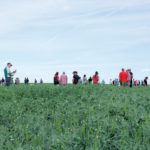My green thumb gets a little twitchy in wintertime and there’s only one cure. I start a little garden on the windowsill, planting to plate in just five days. Yes, I am speaking of sprouts. Delicious, nutritious and green. It is well documented that sprouts are more nutritious than the seeds themselves and, in some […] Read more











